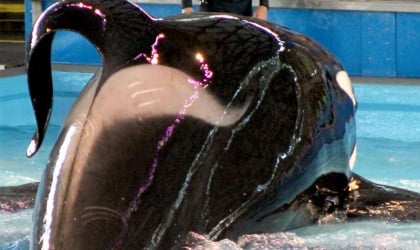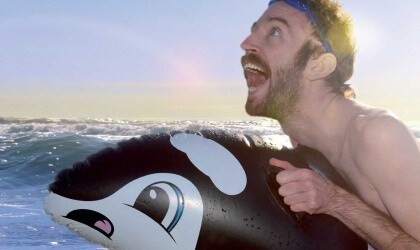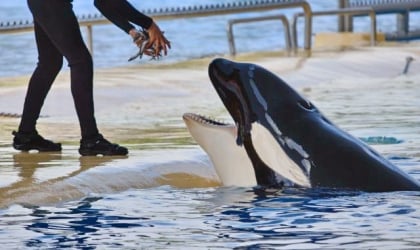When an individual is removed from his or her home by force, imprisoned, made to work, and forever denied their freedom, it’s called “slavery.”
In October 2011, PETA filed a lawsuit against SeaWorld in behalf of five wild-captured orcas seeking a declaration that these five orcas are slaves and subjected to involuntary servitude in violation of the 13th Amendment to the U.S. Constitution. Joined by three orca experts and two former SeaWorld trainers, PETA’s lawsuit asserted that the conditions under which these orcas live constitute the very definition of slavery.
The plaintiffs in the case, Katina, Kasatka, Ulises, and Corky, were captured and taken from their ocean homes and families and are confined to the equivalent of concrete bathtubs, where they are forced to earn money for SeaWorld by performing for customers’ entertainment. They have also been turned into virtual breeding machines in order to provide more performers for SeaWorld’s cruel shows.
The case also sought the release of all five orcas to a more appropriate environment, such as a coastal sanctuary. Protected sea pens would allow orcas greater freedom of movement as well as the opportunity to see, sense, and communicate with their wild cousins and other ocean animals; to feel the tides and waves; and to engage in the behaviors that they’ve long been denied. Eventually and as appropriate, they could be released into the ocean to be reunited with their pods.
PETA’s briefs cited more than 200 years of U.S. Supreme Court precedent, including such landmark cases as Dred Scott, Brown v. Board of Education, and Loving v. Virginia, to establish that the orcas’ species does not deny them the right to be free under the 13th Amendment and that long-established prejudice does not determine constitutional rights.
This case created buzz in the news and scholars have expressed support for the case. Harvard law professor and constitutional scholar Laurence H. Tribe said:
“People may well look back on
this lawsuit and see in it a perceptive glimpse into a future of greater compassion
for species other than our own.”
Although the court did not apply the 13th Amendment to the orcas, we must remember that women, children, and racial and ethnic minorities were once denied fundamental constitutional rights that are now self-evident, and that day will certainly come for the orcas and all the other animals enslaved for human amusement. This case is the first step toward the legal recognition that the 13th Amendment protects the rights of nonhuman animals to be free from enslavement. PETA will continue to pursue every available avenue to fight for these animals.
 Download an article by the legal team examining the factual, theoretical, and strategic
Download an article by the legal team examining the factual, theoretical, and strategic
basis for the lawsuit and discussing the court’s opinion, first published in Animal
Law, Volume 19, Issue 2 (2013): “A Slave by Any Other Name Is Still a Slave: The Tilikum Case and
the Application of the 13th Amendment to Nonhuman Animals.”





